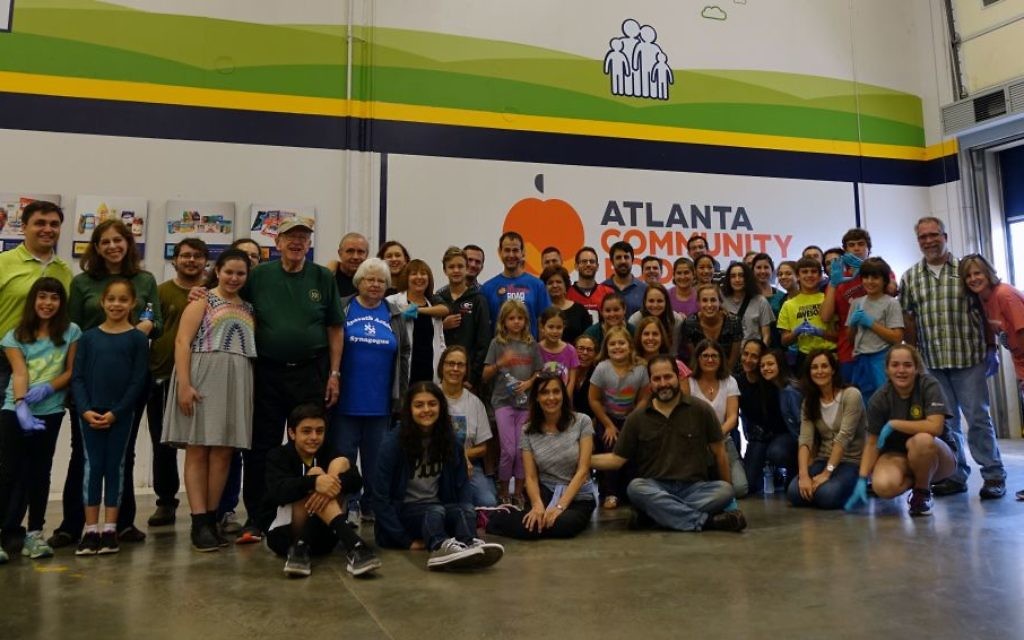Food Pantry Stretches Jewish Safety Net
JF&CS meets a growing need for kosher food and fulfills other financial needs throughout the community.

As you plan for next month’s Passover seder, consider the following.
The communal safety net that supports Atlanta Jews facing “food insecurity” (a government euphemism for hunger) consists of racks of metal shelves and a couple of refrigerators housed in two closet-size rooms at Jewish Family & Career Services.
The shelves of the JF&CS food pantry are stocked with cans, bags, boxes, jars and other packages — all of it kosher. Fresh fruits and vegetables — luxury items, of a sort — are kept cool.
Get The AJT Newsletter by email and never miss our top stories Free Sign Up
The Atlanta Community Food Bank estimates that in its 29-county region, 16 percent of the people, and nearly 25 percent of the children, lack adequate food, often for financial reasons. While there are no statistics on hunger in the Jewish community, experience tells JF&CS staff that the numbers likely mirror the general population.
Though hunger is nondenominational, “if we weren’t kosher, there are people who could not come to us,” said Amy Maslia, who manages the intake process for the myriad of services provided by JF&CS.
Food assistance allows JF&CS clients to stretch their financial resources. The agency assists by making one-time payments to landlords and utility companies.
“I have food. I run out of money for rent, mortgage and utilities,” Maslia said. “We have never had to turn anybody down” at the pantry.
The more food on its shelves, the more people JF&CS can feed. A renovation underway will enlarge the pantry’s quarters — a good thing, as the numbers needing assistance continue to increase.
In fiscal 2010, JF&CS distributed 5,261 pounds of food.
In fiscal 2015, JF&CS distributed 17,300 pounds of food to 385 households, feeding an estimated 1,180 people, among them 175 age 65 or older and 458 age 18 or younger.
Last year, some 22,000 pounds of food went to 750 households, feeding about 2,200 people, including 350 seniors and 740 children.
JF&CS works beyond the Jewish community. On learning that only one-third of pantry clients are Jewish, you might conclude that hunger is less of a problem for Jews locally.
“I think it is greater than the number of people who come to get the food,” Maslia said.
Accepting food carries a greater stigma than receiving other forms of assistance.
Some recipients have trouble looking in the eye those providing the food. “I find it more in the Jewish community than the non-Jewish community,” Maslia said. “Almost always they say, ‘I never thought this would happen to me. I never thought I would be in this situation. I’m the one who gives to other people. I’m the one who makes the donations. I’m the one who gives back.’ ”
JF&CS receives food from individuals (one woman donated a dozen boxes of cereal she bought on sale), from congregations, from Helping Feed Atlanta (a weekly delivery of produce donated by Costco and others) and through Operation Isaiah. The barrels filled during the High Holidays go to the Atlanta Community Food Bank, which last year allowed JF&CS to cull the kosher items. In a pinch, JF&CS will buy from the food bank and from Publix and Kroger. The Giving Garden behind the JF&CS building has yielded its own bounty of vegetables.
The pantry’s financial benefactors include the Jewish Federation of Greater Atlanta, the Hunger Walk/Run, the Atlanta Hunger Relief Fund and at least one generous individual who wishes to remain anonymous. Grocery gift cards have been contributed by various congregations and the Jewish Women’s Fund of Atlanta.
The pantry does not provide meat, poultry or fish, nor dairy products, for reasons of cost and to avoid spoilage.
Maslia said its greatest needs — and all donations are appreciated — are for canned tuna, canned soup, Publix-brand boxed macaroni and cheese (which is kosher), sauce to cover a supply of pasta, and jelly to spread with the peanut butter.
But, please, Maslia said, no matzah meal, a popular post-Passover donation of little use if people cannot afford eggs and oil to mix with it.




comments